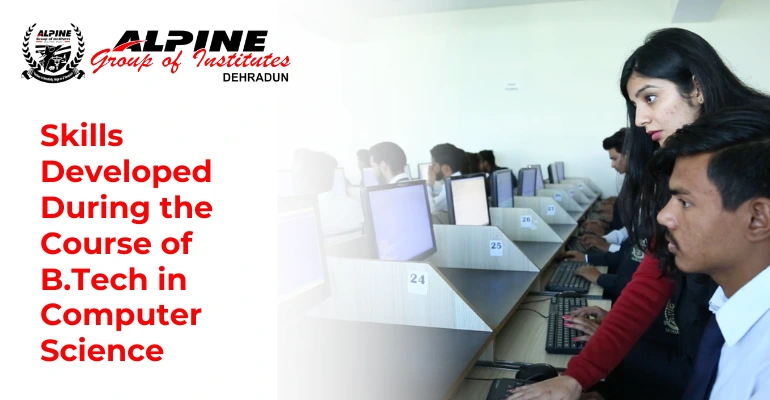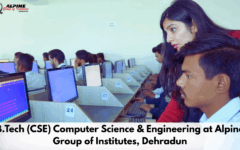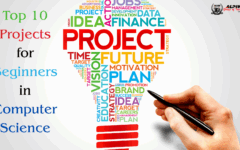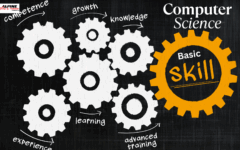Skills Developed During the Course of B.Tech in Computer Science
2024-12-13 7:30Skills Developed During the Course of B.Tech in Computer Science
Pursuing a B.Tech in Computer Science not only equips students with a comprehensive understanding of technical concepts but also helps them develop a wide range of skills that are essential for success in the ever-evolving tech industry. These skills are highly valued by employers and form the foundation for a thriving career in technology.
Here are some key skills that students develop during the course of a B.Tech in Computer Science:
1. Programming Skills
One of the core skills developed during the B.Tech Computer Science program is programming. Students learn several programming languages such as Java, C++, Python, JavaScript, and SQL. They also gain proficiency in object-oriented programming (OOP) and functional programming paradigms, enabling them to write clean, efficient, and scalable code.
Proficiency in programming is essential for developing software, applications, websites, and solving computational problems, making it one of the most important skills for a computer science graduate.
2. Problem-Solving and Analytical Thinking
Computer science is all about solving complex problems using logical thinking. Throughout the course, students are trained to break down large problems into smaller, manageable parts and find efficient solutions. They work on real-world problems, optimize algorithms, and tackle challenges that require critical thinking.
This ability to analyze problems and come up with systematic solutions is crucial in various areas such as software development, data analysis, artificial intelligence, and more.
3. Data Structures and Algorithms
A fundamental aspect of computer science is understanding data structures (such as arrays, stacks, queues, linked lists, trees, and graphs) and algorithms (such as sorting, searching, and dynamic programming). These are the building blocks for developing efficient software and systems.
The ability to select and implement the appropriate data structures and algorithms helps in improving performance, scalability, and resource optimization, which are essential in software development, system design, and problem-solving.
4. Software Development and Engineering
Throughout the B.Tech program, students learn about the software development life cycle (SDLC), which includes requirements gathering, designing, coding, testing, deployment, and maintenance. They develop software solutions, apply industry best practices, and understand how to create reliable, user-friendly, and bug-free applications.
Students also learn about version control systems (e.g., Git) and collaborative development tools, which are essential for working in teams and managing projects in real-world scenarios.
5. Database Management and SQL
A strong understanding of databases is crucial for working with large sets of data. Students learn how to design and manage relational databases using SQL (Structured Query Language). They also explore NoSQL databases for non-relational data storage.
Skills in database design, query optimization, and data management are essential for roles in backend development, data engineering, and data science.
6. Computer Networks
Understanding how computer networks work is vital for many tech-related jobs. In the B.Tech program, students learn about networking protocols, TCP/IP, OSI models, routing, switching, and network security.
This knowledge is essential for roles such as network engineer, systems administrator, and cybersecurity expert, where managing and securing digital communication networks is a priority.
7. Operating Systems and System Programming
Students gain knowledge of operating systems (OS), including concepts such as process management, memory management, file systems, and multitasking. They also learn how operating systems interact with hardware, which is critical for system-level programming.
A solid understanding of OS concepts is essential for careers in systems programming, embedded systems, and performance optimization.
8. Cybersecurity Skills
As digital threats continue to grow, cybersecurity has become a critical aspect of technology. Students learn how to safeguard information systems, detect vulnerabilities, and protect data from cyberattacks. Topics covered include encryption, firewalls, intrusion detection systems, and ethical hacking.
With the growing demand for cybersecurity professionals, students with these skills are well-equipped to work in safeguarding data and systems in a wide range of industries.
9. Artificial Intelligence (AI) and Machine Learning (ML)
Artificial Intelligence and Machine Learning are rapidly evolving fields with a wide range of applications in today’s tech landscape. Students in B.Tech Computer Science are introduced to the concepts of AI, including natural language processing (NLP), neural networks, deep learning, and reinforcement learning.
This knowledge allows students to build intelligent systems that can learn from data, make decisions, and improve over time. AI and ML skills are highly sought after in industries like healthcare, finance, e-commerce, and autonomous systems.
10. Cloud Computing
Cloud computing has revolutionized the way businesses operate, allowing them to access resources and services on-demand. During their studies, students learn how to build, manage, and deploy applications on cloud platforms like Amazon Web Services (AWS), Microsoft Azure, and Google Cloud Platform.
Cloud computing skills are essential for roles such as cloud architect, cloud developer, and DevOps engineer.
11. Web Development
With the growing demand for web-based applications, B.Tech students also develop skills in web development. They learn to build dynamic, responsive websites and applications using technologies like HTML, CSS, JavaScript, and frameworks such as React and Angular.
Web development skills are crucial for creating modern, interactive websites and services that cater to users’ needs.
12. Communication and Teamwork Skills
While technical skills are important, the ability to communicate effectively and work in teams is equally essential. Throughout the B.Tech course, students often engage in group projects, where they must collaborate with peers, communicate their ideas clearly, and resolve conflicts.
These interpersonal skills are valuable when working in diverse teams in real-world tech environments.
13. Adaptability to New Technologies
The tech industry evolves rapidly, and new technologies emerge almost every year. B.Tech in Computer Science equips students with the ability to adapt to new tools, programming languages, and technologies. This adaptability is essential for staying relevant in a competitive and fast-changing job market.
14. Time Management and Project Management
Managing projects, meeting deadlines, and balancing multiple tasks are key skills developed throughout the B.Tech program. Students often juggle assignments, projects, and exams, honing their time management and project management abilities. These skills are transferable to any career and are particularly useful in tech roles where efficiency and productivity are highly valued.
Conclusion
A B.Tech in Computer Science provides students with a robust set of technical and soft skills that are essential in today’s fast-paced, tech-driven world. From programming and problem-solving to cybersecurity and cloud computing, the skills learned throughout the course are highly transferable across various industries and roles.
By developing a solid foundation in these areas, graduates of B.Tech in Computer Science are well-prepared to tackle challenges, innovate, and thrive in their careers. Whether pursuing a career in software development, data science, cybersecurity, or entrepreneurship, the skills gained during this program are crucial for success in the tech industry.









